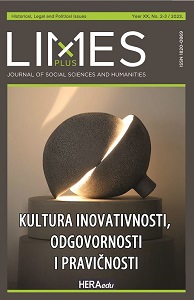ANTROPOLOŠKI „TEREN” NA SOCIJALNIM MREŽAMA: UTICAJ MODERNIH TEHNOLOGIJA NA ROMSKE GRUPE U CRNOJ GORI
ANTHROPOLOGICAL “TERRAIN” ON SOCIAL NETWORKS: THE IMPACT OF MODERN TECHNOLOGIES ON ROMA GROUPS IN MONTENEGRO
Author(s): Vesna DelićSubject(s): Social Sciences, Economy, Media studies, Communication studies, Sociology, Ethnic Minorities Studies, ICT Information and Communications Technologies
Published by: HESPERIAedu
Keywords: Roma; modern technologies; social networks; Montenegro
Summary/Abstract: Modern technologies, i.e. the availability of the Internet on various modern devices, have enabled the opening of “new” social portals and the interweaving of the virtual and real worlds. Social networks have branched out the possibility of connecting between diff erent subjects and diff erent communities, but also created an opportunity for anthropologists to research diff erent cultural phenomena in a diff erent way. With just one click, that is, by accepting the friendship of Roma men or Roma women on social networks, we gained insight into new practices. Personally, I have over seventy friends from the Roma population on my Facebook list, so practically, for many years, I could do “fi eld research from home”. Namely, considering the frequency of Facebook using, as well as the diverse content that Roma publish on a daily basis, which ranges from visual information about their everyday life, sharing videos and photos with religious themes, live broadcastsing of holiday celebrations, engagements and weddings, a whole field of possible anthropological research opened up. Regardless of the fact that this method always depends on the “traditional” way of research, it revealed new practices and mechanisms that are very useful in process of searching for answers to following questions: How much and how are Roma groups changing and in what way the modern technologies and especially young people had an impact on those processes? How powerful has the Internet become in reuniting and bringing together separated members of the Roma family? In the preservation of tradition, even language, through the broadcasting of ritual practices? In strengthening religious identity due to wider availability of religious content? More precisely, the answer to the question of how Roma “live” in the virtual world and how that world affects the entire community when they are offline?
Journal: LIMESplus
- Issue Year: 2023
- Issue No: 2-3
- Page Range: 77-100
- Page Count: 24
- Language: Serbian

